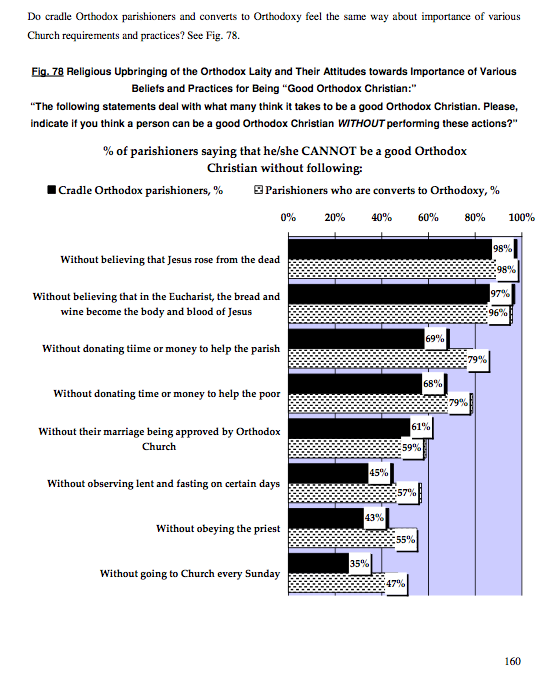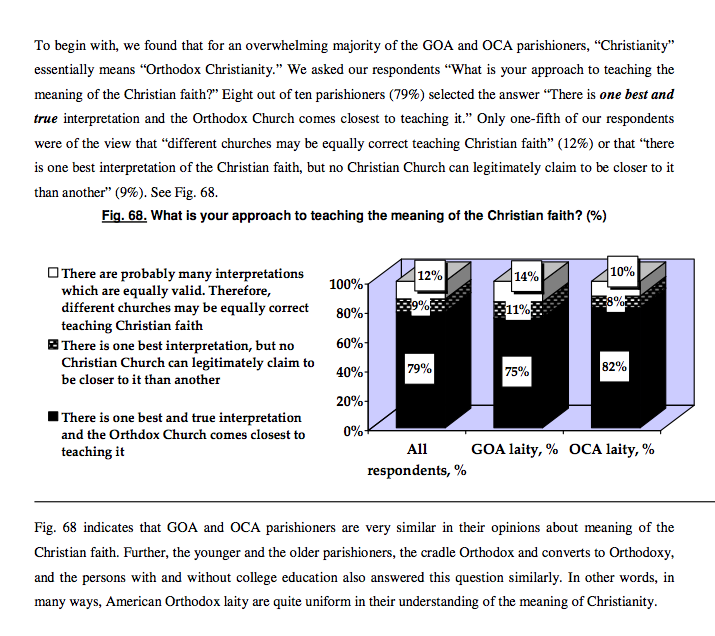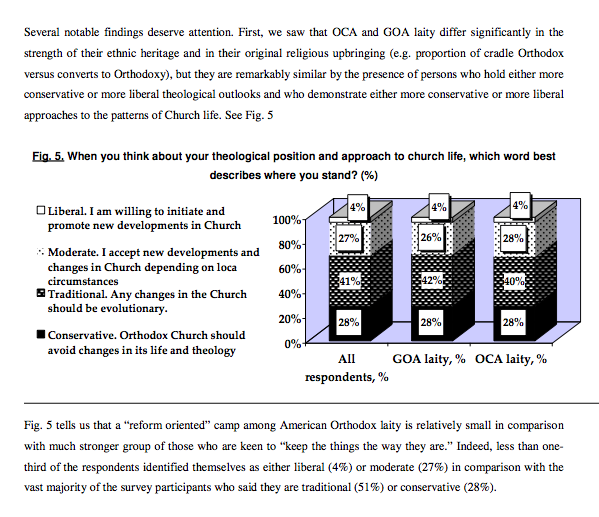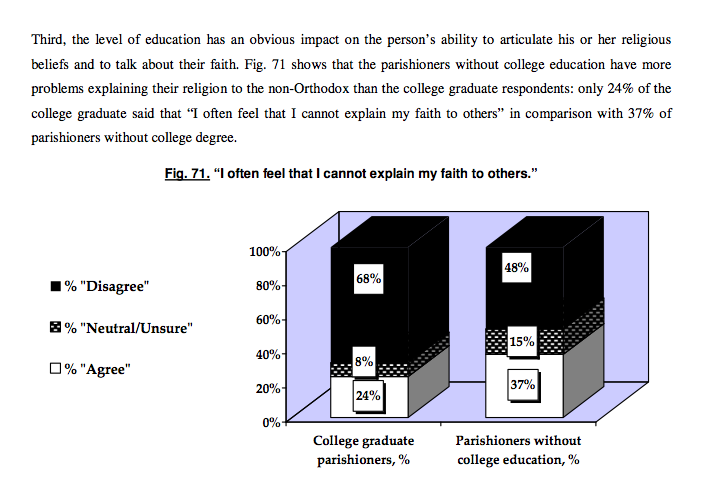A frequent visitor “Prometheus” posed a very good question with respect to my posting “An Orthodox Remedy to Evangelicalism’s Heresy Epidemic.” He asked:
My question is what such a survey would look like in Orthodoxy. Protestants lack certain epistemological bases for their teaching, but the very act of teaching has the chance to provide a lot agreement on “orthodox” issues. The epistemology and the application ore two different issues, and I am interested to know what the orthodoxy of the Orthodox looks like on average.
The best answer I can find is Alexei Krindatch’s report The Orthodox Church Today. It is based on survey research done with some 1000 people from 103 parishes in the Greek Orthodox of America (GOA) and the Orthodox Church in America (OCA) (p. 5). The survey is relatively recent having been done between September 2007 and May 2008.
The survey provides an insightful peek into the empirical reality of Orthodoxy in America — what real flesh and blood Orthodox Christians believe as opposed to the official teachings of the Orthodox Church. It is important to keep in mind that the questions asked by Alexei Krindatch’s survey for the Patriarch Athenagoras Orthodox Institute differ from that posed in Stephen Nichol’s survey done by LifeWay Research for Ligonier Ministries. Below are screen shots of tables showing the various survey results and a few comments on how these bear on Prometheus’ question.
How Orthodox are American Orthodox?
Unlike the Lifeway survey of American Evangelicals which asked a number detailed doctrinal questions, the Orthodox survey combined questions of doctrine with orthopraxy (right practice). It found that nearly all respondents affirmed Jesus’ bodily resurrection (98%) and the doctrine of the real presence in the Eucharist (97%). What is striking about the survey research is that when it comes to doctrine, both cradle Orthodox and converts are on the same page; the difference being 1% or less. With respect to orthopraxy converts tend to be more conservative than cradle Orthodox.
A search of Krindatch’s report for “Trinity” yields only 2 results. We know that American Orthodox are exposed to the Church’s teaching on Trinity every time they attend church but we can only guess as to how well American Orthodox understand the Church’s teaching on baptism. Further research is needed. (Figure 78, p. 160)
How Many Believe the Orthodox Church is the True Church?
The question was asked with respect to whether there were multiple interpretations of the Christian faith or the Orthodox Church being the closest to the “best and true interpretation”? The survey found a strong majority (80%) supporting the position that the Orthodox Church is the closest to the best and true interpretation. Members of the OCA tended to be slightly more conservative than the Greek Orthodox respondents on this issue. (Figure 68, p. 146)
Liberal, Moderate, Traditional, or Conservative?
One interesting question in Krindatch’s survey was how Orthodox Christians identified themselves on a scale from liberal to conservative with respect to church life. It may surprise some that the “liberal” Orthodox are a very small minority, 4%. But while the “liberals” are those who favor change in the Orthodox church, the “moderates” who are open to change make up nearly a quarter of the respondents. Probably, the most significant finding is that a strong majority (almost 70%) identify themselves as either “traditional” or “conservative.” This point to a strong sense of stability in American Orthodoxy. (Figure 5, p. 14)
Self-Confidence in Explaining Orthodoxy to Others
There is a stereotype of the typical Orthodox Christian not being able to explain what he or she believes to others. It is a pleasant surprise that nearly half of Orthodox Christians who have not had a college education and slightly more than two thirds of those who graduated with a college degree feel confident to explain Orthodoxy to others. The flip side of this is that nearly a quarter of those with a college degree and slightly more than a third did not share this confidence. While there is room for improvement in Christian education among American Orthodox, the stereotype of an inarticulate Orthodox is largely a myth. (Figure 71, p. 151)
Conclusion
Survey research questions about theology like that asked of American Evangelicals while helpful have in-built limitations from an Orthodox standpoint. Orthodoxy does not give rote “propositional truth” statements the same kind of premium as does Protestantism. So it is not as critical for an Orthodox believer to be able to spit out the “right answer” to all theological questions. That said, an Orthodox Christian is expected to have self-consciously embraced the Creed and Councils of the Church as providing a fence against heresies. This fence prevents the theological free fall so often seen in Protestant circles. Neither of these are a substitute or excuse for weak understanding of the faith among Orthodox.
Robert Arakaki




Hi Robert,
I’m very impressed by this research. Thank you for bringing it to my attention and the attention of those who interact with your blog.
Great! Thanks!
Thanks Robert! By any chance do you know of any survey research that asks questions about morality/ethics/values? I know that George Barna has done a good amount of research on Evangelical morals, and in much of the research it shows the church is not that much different than the world on values. I was wondering if anything like this has been done on specifically the Orthodox Church in America?
Emmanuel,
Welcome to the OrthodoxBridge!
Thank you for the question about the social/moral views of Orthodox Christians. I suggest you check out Alexei Krindatch’s research report The Orthodox Church Today, Chapter X “Social Attitudes of American Orthodox Laity” p. 138 ff. Take a look there and tell me if it answers your questions.
Robert
Come on Prometheus,
You can do better than that!